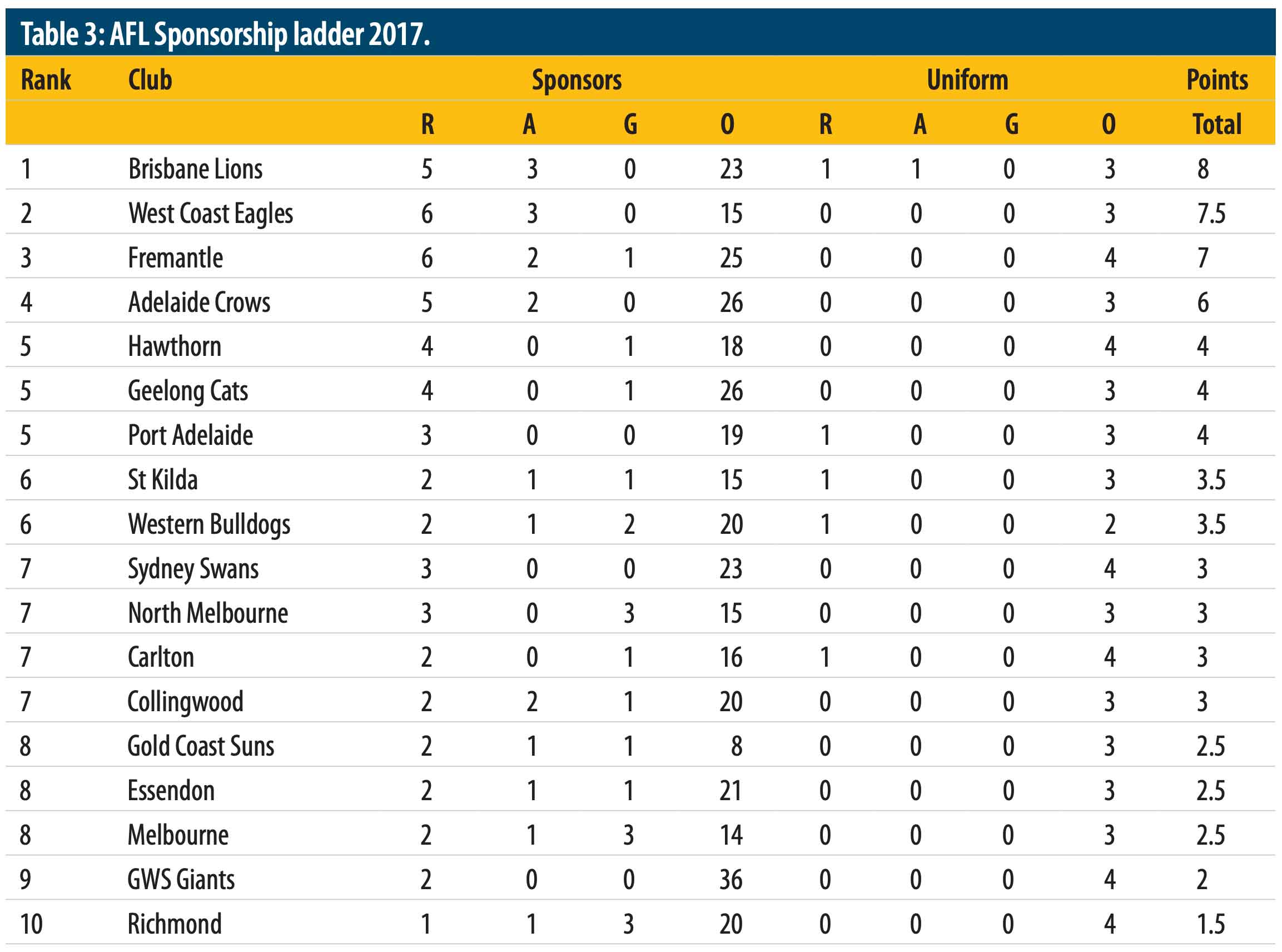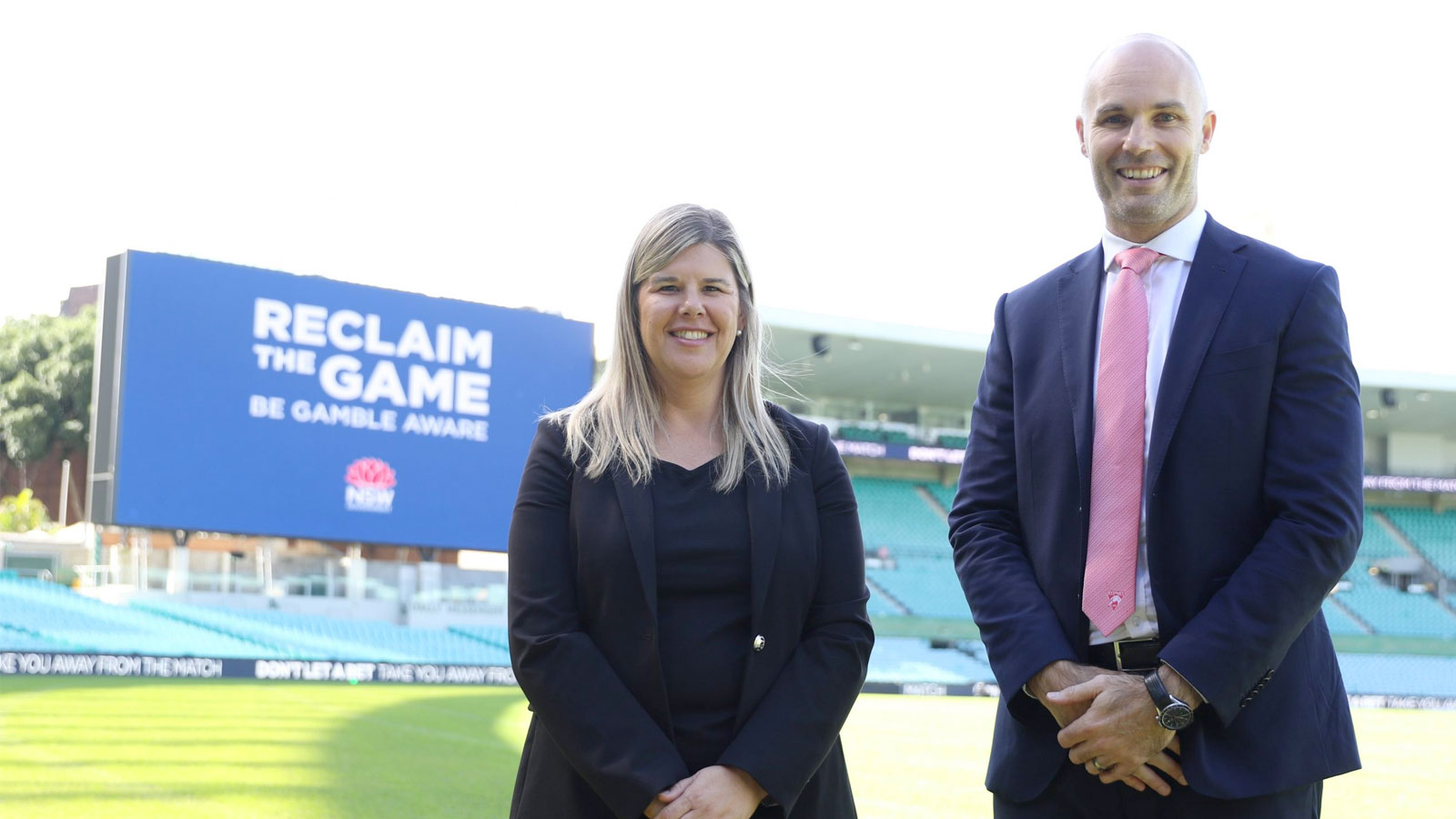Under a new partnership with the Office of Responsible Gambling under the Reclaim the Game initiative, the Sydney Swans have pledged to raise awareness of gambling issues and turn down gambling sponsorships. Fans will soon enjoy games at the SCG free of gambling and betting advertisements.
Gambling sponsorships have historically been lucrative revenue sources, especially for clubs under financial pressure. The vast majority of AFL-level sporting stadiums in Australia have engaged with betting companies, regularly providing in-play on-screen odds, and quarter-break updates from gambling advertisers and sponsors.
 Table of clubs with 'R' (Red = Gambling) sponsorships
Table of clubs with 'R' (Red = Gambling) sponsorships
The issue in the AFL is compounded by the partnership with Sportsbet to provide gambling advertising, odds and data through the AFL website, the AFL app, official AFL media through logos and other forms of media.
The AFL's largest and most popular venue, the MCG, depends on gambling and gaming advertising - it's impossible to go to an AFL match at the 'G without being bombarded from all angles by gambling advertising.
Sydney isn't the first club to break away - Carlton cut ties with William Hill/Sportingbet in 2016, joining with Richmond, Essendon, Hawthorn, Western Bulldogs, St Kilda, Collingwood and North Melbourne in partnership with the Victorian Responsible Gambling Foundation.
The issue of gambling goes deeper than just the clubs - Jaidyn Stephenson and Jake Stringer two high-profile players who've experienced gambling issues. Stephenson was suspended for the final 10 games in 2019 for placing bets on himself and other Collingwood games.
The Swans have committed to educating their staff, players and fans about the risks associated with gambling.
Club Chief Executive Tom Harley stated that the club was delighted to be working in partnership with the NSW Government's Reclaim the Game initiative.
"We are really pleased to be working in partnership with the Office of Responsible Gambling in reducing the reliance on gambling revenue and raising the awareness of risks associated with gambling," Harley said.
"The focus of our partnership is on reinforcing key messages associated with responsible gambling and as part of this, The Swans will not promote gambling advertising or sponsorship.
"We are working closely with the Reclaim the Game program to make positive impacts on our community's attitudes towards responsible gambling."
Natalie Wright, Director of the Office of Responsible Gambling, was excited to see other codes join the initiative.
"We now have four major agreements across three of the most popular codes after starting with cricket. That really speaks to clubs recognising their role in looking after their fans and their communities," Wright said.
"Sport is a big part of our Australian culture, and it should be enjoyed without having to experience gambling advertising as part of a match."
This is a significant shift in the AFL, for the Sydney Swans - in partnership with the SCG - to remove gambling and betting advertisements from their matches, and ensure safe and appropriate advertising.
A study conducted in 2018 by Ainslie Satori, Melissa Stoneham and Melinda Edmunds, concluded that unhealthy advertising and unhealthy sponsorship on AFL club websites and player uniforms is extensive.
"All 18 clubs had at least one Red sponsor. Fifteen clubs were sponsored by alcohol companies. Five clubs featured Red sponsor logos on their playing uniforms. Twelve clubs had Green sponsors. No clubs displayed Green sponsors on their playing uniforms."
The implications on public health is that sponsorship offers companies an avenue to expose children and young people to their brand, encouraging a connection.
"The AFL could reinforce healthy lifestyle choices by shifting the focus away from the visual presence of unhealthy sponsorship, while taking steps to ensure that clubs remain commercially viable.
"Policy makers are encouraged to consider innovative health promotion strategies and work with sporting clubs and codes to ensure healthy messages are prominent."
Prior studies conducted on Alcohol and Tabacco have resulted in recommendations to reduce, or remove the prevalence of advertising in public areas, especially where children are present.
"The World Health Organization (WHO) has made recommendations for the marketing of food and non-alcoholic beverages to children, which includes marketing in children’s settings."
"There is strong evidence to suggest that children, especially those under eight years old, are extremely susceptible to marketing because they do not have the experience or cognitive skills to critically evaluate the messages being promoted."
Like what you’re getting? Want more Swans Blog, and the chance to have your input into our site and what we create? We have additional content weekly on our Patreon Service. This is your avenue, what are you waiting for? Sign up today and get more content like this.
If you'd like to support us, you can head over to our Red Bubble Swans Blog Shop, and purchase one of our hideously overpriced mugs, stickers or notebooks. Help keep The Swans Blog alive.
Want instant access to the latest blog and news content from The Swans Blog?
Download our Android App from Google Play today.

